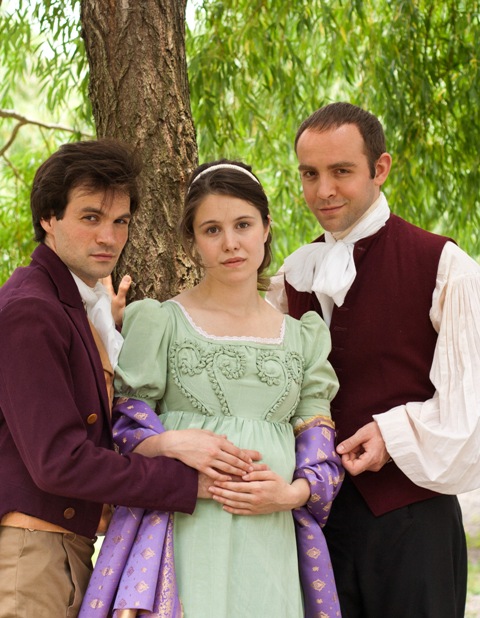
Nate Gundy (Percy Shelley), Julia Specht (Mary Wollstoncraft Godwin), Victor Shopov (Lord Byron). Photo by Alison Luntz.
Hideous Progeny by Emily Dendinger. Holland Productions, Boston Playwrights’ Theatre, 7/9/11-7/23/11, http://www.hollandproductions.org/.
Reviewed by Becca Kidwell
Mary Wollstonecraft Godwin’s understanding of the gravity of creation led to one of the most famous horror tales of all time: Frankenstein. Emily Dendiger posits that this knowledge came from Mary’s own life and relationships in the play Hideous Progeny. Most generations struggle between rebellion and responsibility; the choices we make create the world that we live in. Mary’s future husband, Percy Shelley, speaks of and practices “free love” and ideals, but ignores the monsters he releases. Hideous Progeny haunts Mary Godwin and the audience with the question: do you run away from the monsters or do you face them?
Not unlike the “summer of love” in the 1960’s, a group of artists gather at a villa in Switzerland to indulge in pleasure and curiosity. Lord Byron, played by Victor Shopov, acts as host to this party. Wild nights are not surprising given Byron’s reputation; however, Denginger’s words and Shopov’s actions present an older, wiser man who may or may not have earned that reputation, but definitely was the creator of that reputation. He plays the misogynistic, narcissistic, womanizer in front of the entire group, but drops his facade in front of Mary Godwin out of admiration or love. Victor Shopov’s grandiose persona effectively teeters between hubris and tenderness. This Byron acts the way people expect him to act when he is in a large group, but allows himself to be “real” in the presence of the very “real” Mary Godwin.
Mary Wollstonecraft Godwin’s dreams slip between her nightmares. Julia Specht portrays the strong, intelligent, young writer who has experienced “real” life since her first breath–when her mother died. No more than twenty-one, Godwin has one child and another on the way and is still waiting for Percy Shelley (played by Nate Gundy) to marry her. Specht’s strong, yet feminine portrayal stands firm against a world of self-indulgence. Sprecht’s Godwin sees things for how they are; she can neither hide from the severe realities of her life nor hide them from the world anymore. When Byron sets up a contest to find see who could write the most original horror story, Mary uses truth through the lens of fantasy to create her terrifying tale. Her tale horrifies not because of an unknown force, but a known terror: reality. Mary learns that the only monsters that chase her are the ones she ignores.
Percy Shelley, played by Nate Gundy, is a dashing poet who has won Mary’s heart and flesh. He espouses the high artistic views of love and does not want to be shackled by marriage. These ideals lead to beautiful poems, but horrifying realities–which he will not face. He does not think but only moves. Gundy’s performance embodies Shelley’s charms and ideals. It is understandable why Mary fell in love with him, and it is understandable why he is seldom blamed for his actions.
Maggie Erwin is Lord Byron’s young paramour Claire Clairmont. Maggie is filled with youthful indiscretion and high spirits fit her character perfectly and spread throughout the cast. As Claire, Erwin provides the counterweight of frivolity to Mary’s steadfastness. Erwin and Specht’s dynamic is reminiscent of many of the dichotomies of Jane Austen’s literature. Lydia Barnett-Mulligan and Alex Simoes’ characters provide the working class perspective of this life of luxury and excess. Elise and Dr. Polidori get swept up in the pleasurable world of the Byrons and the Shelleys, but the reality of their lives is not easily hidden behind muslin and parchment.
The pacing of the action is somewhat slow at the beginning when the audience first views the tediousness of Byron’s guests, but the story swiftly moves from stillness to a whirlwind as the characters speak and act with little thought-except for Mary and sometimes Byron. The costumes and set evoke the regency era in a way that is familiar to all viewers of recent Jane Austen films. However, this is not Jane Austen. The costumes serve as a contrast to the characters they envelop. The light beauty is savaged by cruel children playing at adulthood.
Dendinger and D’Agostino bring forth a heroine for the 21st century. Hideous Progeny does not provide clear answers or explanations, but it does provide a woman who is willing to endure the stresses and strains of life to live. Mary Wollstonecraft Godwin Shelley does not pretend to be perfect. She has one child by Shelley and another on the way and has yet to be married to Shelley. She owns the hand she has played in her own creations–even if they were not created in the way she would have wanted them to be. This play uncovers the dark side of human nature and the choices we all have to make. Emily Dendinger and Krista D’Agostino’s creation is not always the easiest to live with as we might not want to see the truth; but sometimes the only way we can see reality is through the eyes of fantasy. Which road do you choose? TNETG. 7/14/11.
